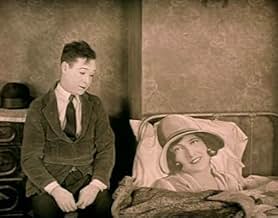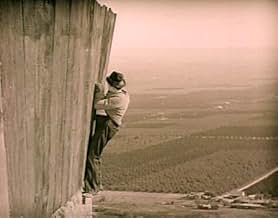AVALIAÇÃO DA IMDb
6,3/10
835
SUA AVALIAÇÃO
Adicionar um enredo no seu idiomaLow-life Harry falls in love with sweet Betty who inspires him to improve himself so he can marry her. He enters a $25, 000 cross-country hiking contest. After many adventures he wins, pays ... Ler tudoLow-life Harry falls in love with sweet Betty who inspires him to improve himself so he can marry her. He enters a $25, 000 cross-country hiking contest. After many adventures he wins, pays off his father Amos's mortgage and marries Betty.Low-life Harry falls in love with sweet Betty who inspires him to improve himself so he can marry her. He enters a $25, 000 cross-country hiking contest. After many adventures he wins, pays off his father Amos's mortgage and marries Betty.
- Prêmios
- 1 vitória no total
Avaliação em destaque
"Tramp, Tramp, Tramp" was the first feature film Harry Langdon made for his own newly formed production company to be distributed by First National Pictures, and the first of his features to be released.As such it faced the problem of adapting his slow, underplayed style of comedy to a greater length for the greater length and more lavish production of a feature, and it meets this challenge well to create a very funny film.
The plot is strange -- essentially Harry finds himself walking in a cross-country marathon to save his father's shoe business -- but it manages to pull of the trick of remaining quite unified while encapsulating a number of discrete stages for Harry to do spread out and do comedy. The first ten minutes or so of the film are taken just to lay out the scenario, and that saves the necessity of their being interruptions during further scenes. In fact, all the opening revelations about the small businessman being squeezed dry by the big company are played more like grim drama than comedy, and this works -- I think Harry Langdon is funnier when he innocent, childlike, and somehow supernatural character is contrasted with the unpleasantness of reality.
Harry's fallen in love with a young Joan Crawford, the girl on the shoe conglomerate's billboards. This is funny in itself just as a concept, funny because of the humorous sight of sophisticated, glamorous Joan and befuddled, infantile Harry falling for each other, and funny because of gags that are drawn out of it (the torn-off images of her all around Harry's hotel room, and then hiding under his sheets). It also works to drive Harry along in walking the race. The girl's character isn't really built though, and little time is actually spent on their interactions (except for a great gag shot where a house is blown away in a cyclone to reveal them kissing passionately). At such this element of the film works well, but "Tramp, Tramp, Tramp" doesn't have quite the emotional punch that other Langdon comedies sometimes have.
Of course, the real comedy in a good Harry Langdon comedy comes mainly between what happens, from Harry's subtle but mesmerizing and hilarious little reactions and ineffectual, childish attempts at action. This film allows for a good assortment of comedy set pieces where there is room for that, and probably one of Harry's best pieces of pantomime comes in the extended shot where he is flummoxed by encountering two Betty Burtn's at once: one on a billboard and one the real person. It would be a throwaway gag to most comedians, but Harry draws a long series of laughs from his reactions to it. There's a great scene around Harry's inadvertent antagonism of his new roommate the walking champion of the world (in which, in the don't-try-this-at-home department, he is given a whole handful of sleeping pills), and a sequence of Harry in a chain-gang after his arrest for stealing berries that could have been rearranged slightly into its own two-reel comedy. It also contains perhaps my favorite little moment where Harry, breaking up tiny rocks with his tiny hammer, is given a gun -- and uses the butt of it to break up slightly bigger rocks.
While the characteristic signature of Langdon is in these moments, bigger production gags are in evidence here as well, and are both funny and impressive. Especially the scene in which Harry, after hanging off a cliff (and, characteristically, is very funny just by being oblivious to it) falls down it but easily survives by accidentally sliding on a detached fence, and the one in which the barber shop he has entered is constantly being physically twisted around by a volcano are extremely funny, inventive, and visually impressive.
The end, in which Harry is revealed to have had a baby named Harry that is exactly like him in an over-sized cradle, is very weird, but somehow very appropriate. Harry is an eternal baby in a grown-up world, who will be somehow the same no matter what his supposed real age.
The plot is strange -- essentially Harry finds himself walking in a cross-country marathon to save his father's shoe business -- but it manages to pull of the trick of remaining quite unified while encapsulating a number of discrete stages for Harry to do spread out and do comedy. The first ten minutes or so of the film are taken just to lay out the scenario, and that saves the necessity of their being interruptions during further scenes. In fact, all the opening revelations about the small businessman being squeezed dry by the big company are played more like grim drama than comedy, and this works -- I think Harry Langdon is funnier when he innocent, childlike, and somehow supernatural character is contrasted with the unpleasantness of reality.
Harry's fallen in love with a young Joan Crawford, the girl on the shoe conglomerate's billboards. This is funny in itself just as a concept, funny because of the humorous sight of sophisticated, glamorous Joan and befuddled, infantile Harry falling for each other, and funny because of gags that are drawn out of it (the torn-off images of her all around Harry's hotel room, and then hiding under his sheets). It also works to drive Harry along in walking the race. The girl's character isn't really built though, and little time is actually spent on their interactions (except for a great gag shot where a house is blown away in a cyclone to reveal them kissing passionately). At such this element of the film works well, but "Tramp, Tramp, Tramp" doesn't have quite the emotional punch that other Langdon comedies sometimes have.
Of course, the real comedy in a good Harry Langdon comedy comes mainly between what happens, from Harry's subtle but mesmerizing and hilarious little reactions and ineffectual, childish attempts at action. This film allows for a good assortment of comedy set pieces where there is room for that, and probably one of Harry's best pieces of pantomime comes in the extended shot where he is flummoxed by encountering two Betty Burtn's at once: one on a billboard and one the real person. It would be a throwaway gag to most comedians, but Harry draws a long series of laughs from his reactions to it. There's a great scene around Harry's inadvertent antagonism of his new roommate the walking champion of the world (in which, in the don't-try-this-at-home department, he is given a whole handful of sleeping pills), and a sequence of Harry in a chain-gang after his arrest for stealing berries that could have been rearranged slightly into its own two-reel comedy. It also contains perhaps my favorite little moment where Harry, breaking up tiny rocks with his tiny hammer, is given a gun -- and uses the butt of it to break up slightly bigger rocks.
While the characteristic signature of Langdon is in these moments, bigger production gags are in evidence here as well, and are both funny and impressive. Especially the scene in which Harry, after hanging off a cliff (and, characteristically, is very funny just by being oblivious to it) falls down it but easily survives by accidentally sliding on a detached fence, and the one in which the barber shop he has entered is constantly being physically twisted around by a volcano are extremely funny, inventive, and visually impressive.
The end, in which Harry is revealed to have had a baby named Harry that is exactly like him in an over-sized cradle, is very weird, but somehow very appropriate. Harry is an eternal baby in a grown-up world, who will be somehow the same no matter what his supposed real age.
- hte-trasme
- 23 de dez. de 2009
- Link permanente
Enredo
Você sabia?
- CuriosidadesWhen Harry and Betty's "baby" is introduced, we see that he is also played by Harry Langdon. This came about because the real baby that was to be used for the scene wouldn't cooperate, and as a gag Langdon had the cameraman shoot him playing the baby. After it was screened, Langdon liked it so much he left it in.
- ConexõesFeatured in Hollywood: Comedy: A Serious Business (1980)
Principais escolhas
Faça login para avaliar e ver a lista de recomendações personalizadas
Detalhes
Bilheteria
- Faturamento bruto nos EUA e Canadá
- US$ 243.700
- Tempo de duração1 hora 2 minutos
- Cor
- Mixagem de som
- Proporção
- 1.33 : 1
Contribua para esta página
Sugerir uma alteração ou adicionar conteúdo ausente

Principal brecha
By what name was O Andarilho (1926) officially released in Canada in English?
Responda

























